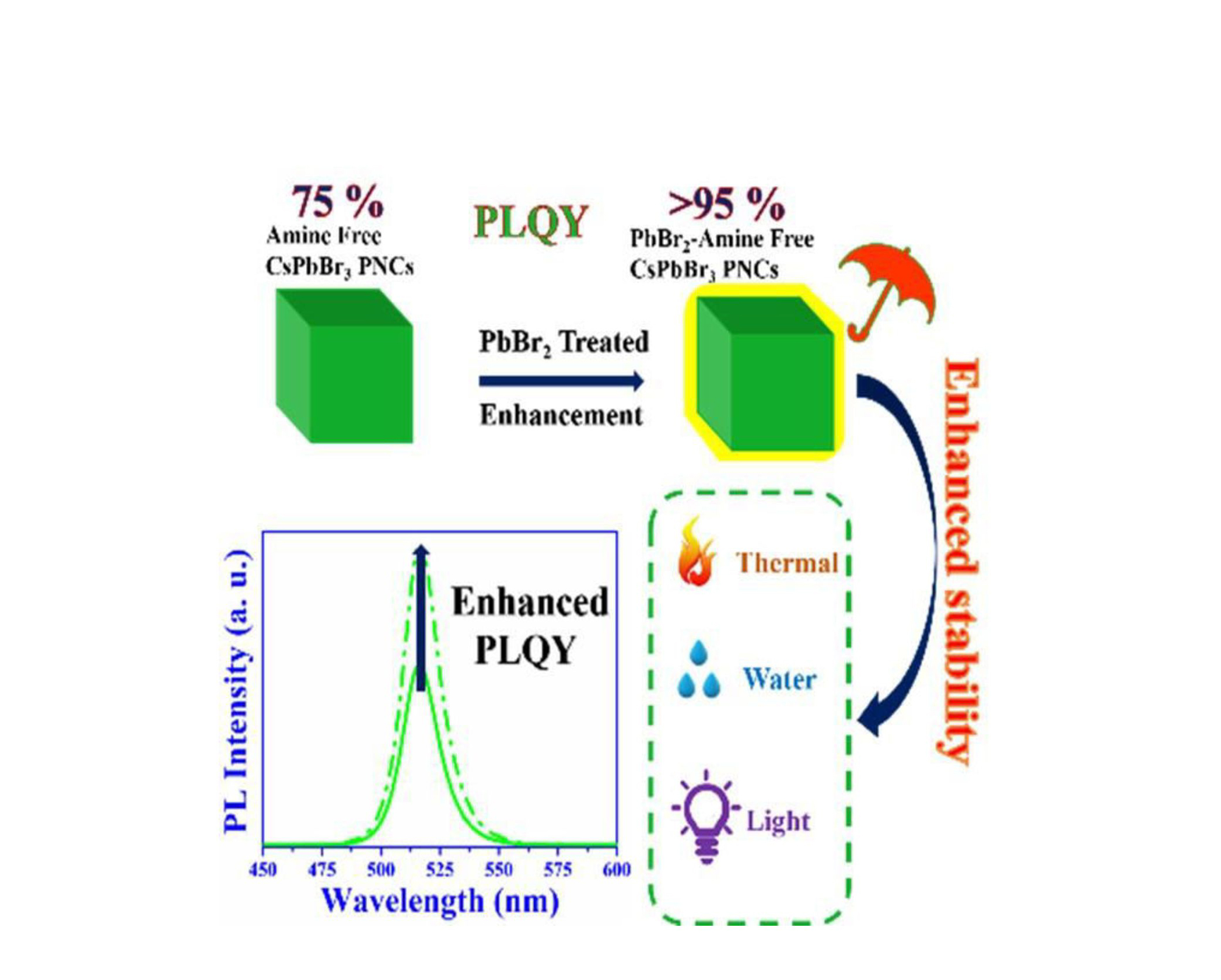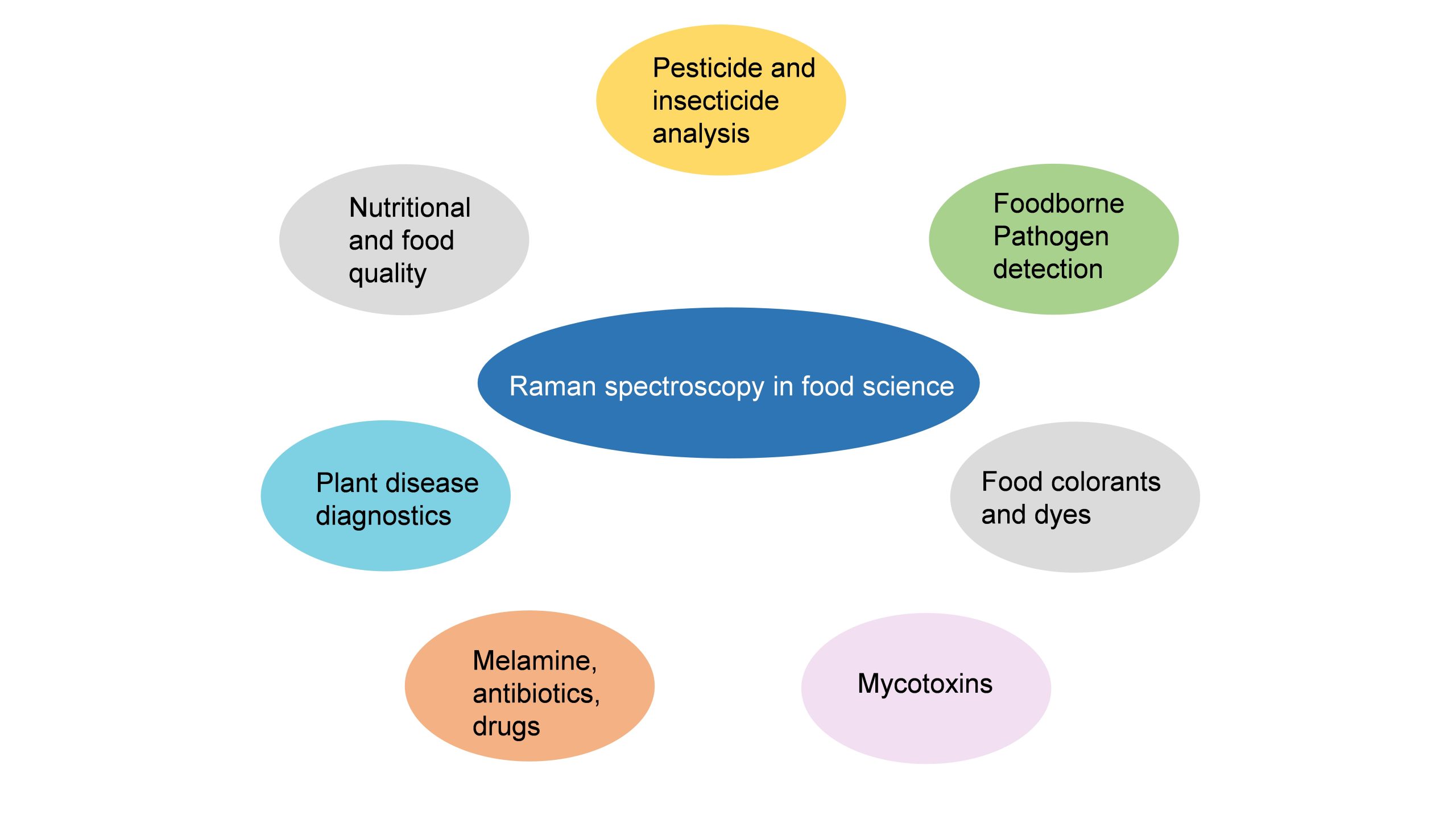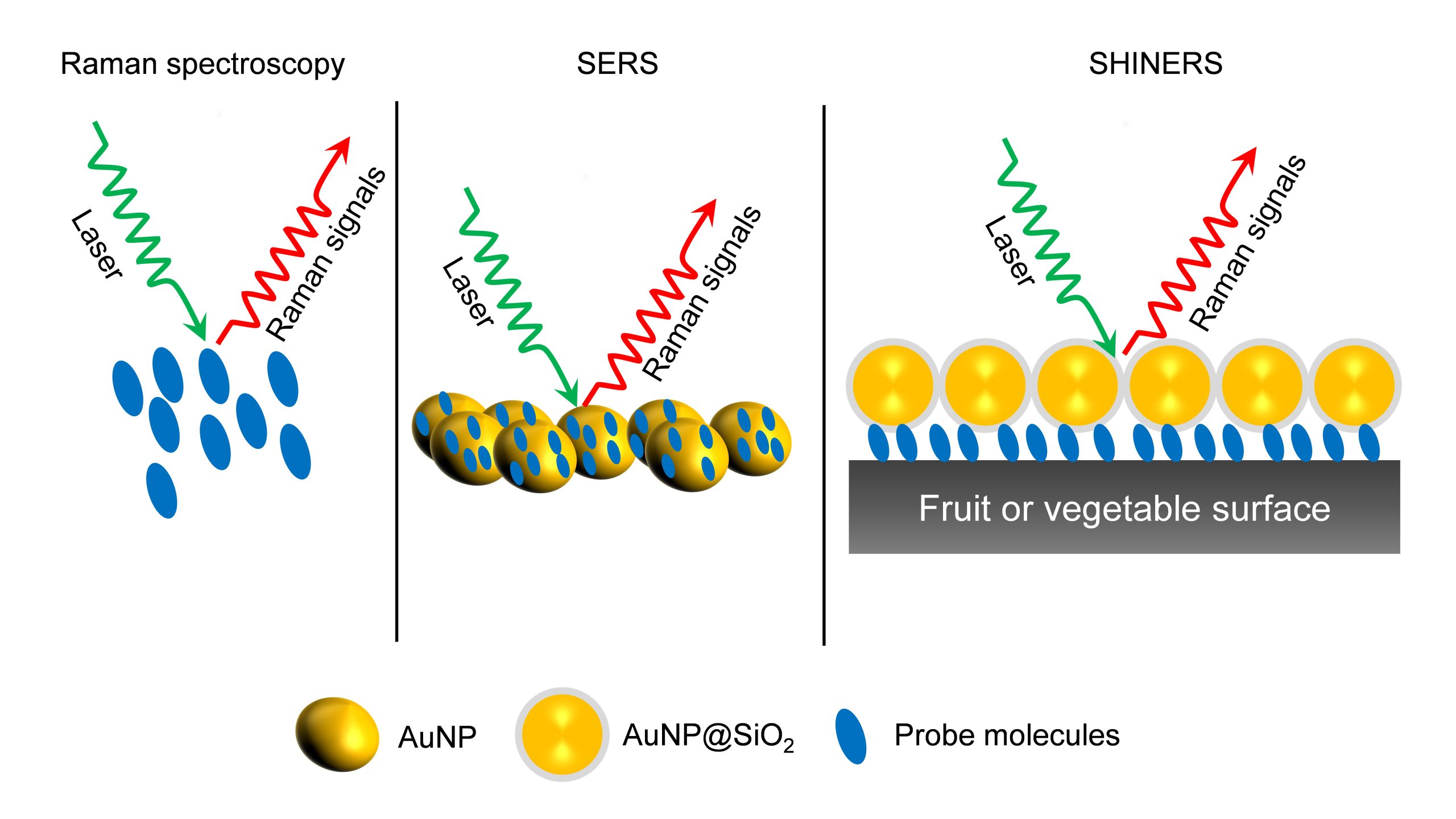Recent News
- Published the 5th consecutive article in the American Chemical Society July 11, 2022
The Department of chemistry has always been a dynamic space for innovative and inspiring research. Recently, Assistant Professor Dr Nimai Mishra published his fifteenth research paper from SRM university-AP as a corresponding author. The paper is titled Post-synthesis Treatment with Lead Bromide for Obtaining Near Unity Photoluminescence Quantum Yield and Ultra-Stable Amine Free CsPbBr 3 Perovskite Nanocrystal and is published in the Q1 journal, The Journal of Physical Chemistry C with an impact factor of 4.2. The research group is comprised of Dr Mishra’s PhD students Mr Syed Akhil, Dr V G Vasavi Dutt, and Mr Rahul Singh. This is the group’s fifth consecutive article published in the American Chemical Society.
About the article
 The article reports Ultra-Stable and Near Unity Photoluminescence Quantum Yield Amine Free CsPbBr 3 Perovskite Nanocrystal Post-synthesis Treatment with Lead Bromide. Herein, the researchers have introduced a simple lead bromide (PbBr 2 ) post-treatment process to achieve the near-unity PLQY (>95 %) in amine-free CsPbBr 3 PNCs. Furthermore, PbBr 2 treatment enables these materials to drastically improve stability in different environmental conditions (polar solvents, light, and heat). In addition, a green-emitting down- converted light-emitting diode was fabricated using PbBr 2 treated amine-free CsPbBr 3 PNCs, which shows its considerable prospects for display applications. Thus, the results of the research will promote these PbBr 2 treated amine-free inorganic perovskite nanocrystals for commercial development in optoelectronic applications.
The article reports Ultra-Stable and Near Unity Photoluminescence Quantum Yield Amine Free CsPbBr 3 Perovskite Nanocrystal Post-synthesis Treatment with Lead Bromide. Herein, the researchers have introduced a simple lead bromide (PbBr 2 ) post-treatment process to achieve the near-unity PLQY (>95 %) in amine-free CsPbBr 3 PNCs. Furthermore, PbBr 2 treatment enables these materials to drastically improve stability in different environmental conditions (polar solvents, light, and heat). In addition, a green-emitting down- converted light-emitting diode was fabricated using PbBr 2 treated amine-free CsPbBr 3 PNCs, which shows its considerable prospects for display applications. Thus, the results of the research will promote these PbBr 2 treated amine-free inorganic perovskite nanocrystals for commercial development in optoelectronic applications.Explanation of the research
Cesium lead halide perovskite nanocrystals (PNCs) have been the flourishing area of research in the field of photovoltaic and optoelectronic applications because of their excellent optical and electronic properties. Mainly, cesium lead bromide (CsPbBr 3 ) NCs with bright green photoluminescence (PL) and narrow full-width at half-maximum (FWHM) of < 25 nm is the most desirable for television displays and green-emitting LEDs. Improving the photoluminescence quantum yields (PLQYs) and optimizing the stability have been challenging tasks to promote cesium lead halide (CsPbX3; X=Cl, Br and I) perovskite nanocrystals (PNCs) for real optoelectronic applications. In recent years, the amine- free synthesis route has become an option for making stable CsPbX 3 PNCs.
Continue reading → - Enhanced charge transport behaviour of protein-metal nanocluster hybrid June 14, 2022

Proteins are the most vital life forms which maintain close coordination with almost living activities through their biological functions. Nevertheless, in most cases, proteins suffer from low charge (electron) transfer efficiency as they are mainly made of insulating organic molecules. The interdisciplinary research publication, of Dr Sabyasachi Mukhopadhyay and Dr Sabyasachi Chakrabortty from the Department of Physics & Department of Chemistry respectively, along with their PhD scholars: Ms Ashwini Nawade, Mr Kumar Babu Busi and Ms Kunchanapalli Ramya, envisions the molecular-level understanding of the charge transport behaviour of various protein-metal nanocluster hybrid.
The article titled ‘“Improved Charge Transport across Bovine Serum Albumin – Au Nanoclusters’ Hybrid Molecular Junction” was featured in the prestigious Q1 journal ACS Omega (IF: 3.512), published by the ‘American Chemical Society’. They successfully incorporated Gold Nanoclusters inside the protein backbone leading to an increase in their conductivity. This will provide new avenues for the rational design of bioelectronic devices with optimized features. The BSA-Au cluster has been a promising model for bioelectronic functionalities. With an increase in their current carrying capacity, they can be used for many more applications, especially as the interface between tissue and organ in biocompatible devices. The research team is also planning to work with various protein dopants to understand their charge transport mechanism. These studies will help in using the protein for various applications mainly in bioimplants or biosensors for drug testing and diagnostics purposes.
Abstract of the Research
Proteins, a highly complex substance, have been the essential element in the living organism where various applications are envisioned due to their biocompatible nature. Apart from protein’s biological functions, contemporary research mainly focuses on their evolving potential associated with nanoscale electronics. Here, we report one type of chemical doping process in model protein molecules (BSA) to modulate its electrical conductivity by incorporating metal (Gold) nanoclusters on the surface or within it. The as-synthesized Au NCs incorporated inside the BSA (Au 1 to Au 6) were optically well characterized with UV-Vis, time-resolved photoluminescence (TRPL), X-ray photon spectroscopy, and high-resolution transmission electron microscopy techniques. The PL quantum yield for Au 1 is 6.8% whereas Au 6 is 0.03%. In addition, the electrical measurements showed ~10-fold enhancement of conductivity in Au 6 where maximum loading of Au NCs was predicted inside the protein matrix. We observed a dynamic behaviour in the electrical conduction of such protein-nanocluster films, which could have real-time applications in preparing biocompatible electronic devices.
Continue reading → - Food safety applications of surface-enhanced Raman Spectroscopy June 10, 2022

Surface-enhanced Raman Spectroscopy (SERS) is a nuanced chemical technique that amplifies the Raman scattering of molecules by utilising plasmonic nanostructured materials. SERS operates as a powerful detection tool that allows for the structural fingerprinting of a molecule. The ultra-high sensitivity and selectivity of the process offer it a vast array of applications in surface and interface chemistry, nanotechnology, biology, biomedicine, food science, environmental analysis and other areas.
Dr J P Raja Pandiyan and his PhD scholar, Ms Arunima Jinachandran from the Department of Chemistry have been keenly involved in exploring the possibilities of SERS technology in food science and other fields. The safety and quality concerns related to food were the primary reasons that impelled them to step into this domain. Their article “Surface-enhanced Raman spectroscopy for food quality and safety monitoring” was published in the book Nanotechnology Applications for Food Safety and Quality Monitoring, published by Elsevier. The article was published in collaboration with Dr Selvaraju Kanagarajan from the Swedish University of Agricultural Sciences.
Continue reading → As an analytical technique, SERS possesses several advantages such as non-destructive, sensitive, and selective. In the chapter, the necessity, and applications of SERS in food science are elaborately discussed. They have also discussed all the possible food contaminants and how to identify them using SERS to ensure food quality. This book will serve as an enlightening read to research groups who are working on Raman, surface-enhanced Raman spectroscopy, analytical chemistry, and food quality analysis.
As an analytical technique, SERS possesses several advantages such as non-destructive, sensitive, and selective. In the chapter, the necessity, and applications of SERS in food science are elaborately discussed. They have also discussed all the possible food contaminants and how to identify them using SERS to ensure food quality. This book will serve as an enlightening read to research groups who are working on Raman, surface-enhanced Raman spectroscopy, analytical chemistry, and food quality analysis. - Ultra-stable perovskite nanocrystals for light-emitting applications June 1, 2022

Cesium lead halide perovskite nanocrystals (PNCs) belong to the flourishing research area in the field of photovoltaic and optoelectronic applications because of their excellent optical and electronic properties. Mainly, Cesium lead bromide (CsPbBr3) NCs with bright green photoluminescence (PL) and narrow full-width at half-maximum (FWHM) of <25 nm are the most desirable for television displays and green-emitting LEDs. However, challenges with respect to CsPbBr3 PNCs‘ stability, limit their usage in practical applications. The recent findings of Dr Nimai Mishra and his research team assert that surface passivation with an additional ligand could be an excellent, easy, and facile approach to enhancing the photoluminescence and stability of PNCs.
Dr Nimai Mishra, Assistant Professor, Department of Chemistry, along with his research group comprising of students pursuing PhD under him, Dr V G Vasavi Dutt, Mr Syed Akhil, Mr Rahul Singh, and Mr Manoj Palabathuni have published their research article titled “Year-Long Stability and Near-Unity Photoluminescence Quantum Yield of CsPbBr3 Perovskite Nanocrystals by Benzoic Acid Post-treatment“ in The Journal of Physical Chemistry C (A Q1 journal published by ‘The American Chemical Society’) having an impact factor of ~4.2.
In this article, the research group addresses the stability issues of green-emitting CsPbBr3 PNCs with simple post-treatment using benzoic acid (BA). A remarkable improvement in PLQY from 69.8% to 97% (near unity) was observed in benzoic acid-treated CsPbBr3 PNCs. The effective surface passivation by benzoic acid is also apparent from PL decay profiles of BA-CsPbBr3 PNCs. The long-term ambient stability and stability against ethanol of BA-CsPbBr3 PNCs are also well presented in the research. The PL intensity of untreated CsPbBr3 PNCs is completely lost within five months since the synthesis date, while ̴ 65% of initial PL intensity is preserved for BA-CsPbBr3 PNCs even after one year.
Furthermore, BA-CsPbBr3 PNCs exhibits excellent photo-stability where 36% of PL is retained while PL is completely quenched when the PNCs are exposed to 24 hours of continuous UV irradiation. Importantly, BA-CsPbBr3 PNCs show excellent stability against ethanol treatment as well. Finally, green, emitting diodes using BA-CsPbBr3 PNCs are fabricated by drop-casting NCs onto blue-emitting LED lights. Thus a simple benzoic acid posttreatment further presents the scope of use of these materials display technologies.

